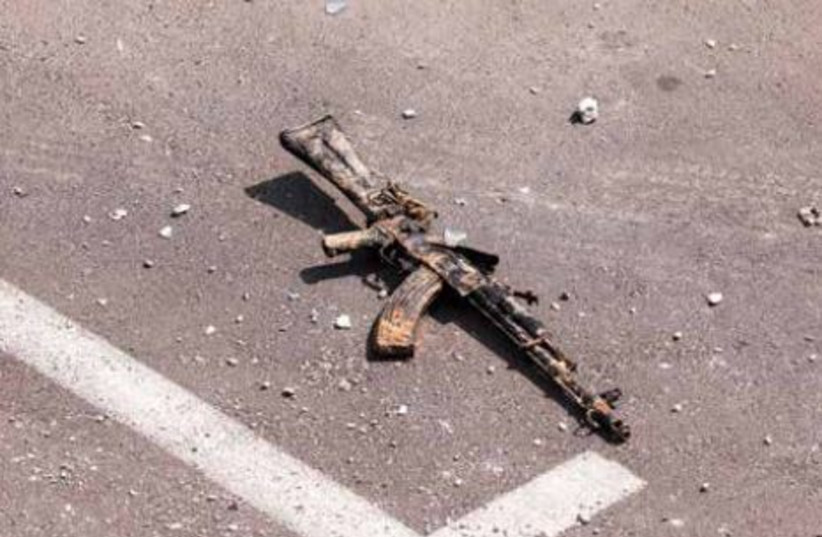What was, can no longer be.
That is the one simple and basic conclusion from this past week and the massacre that Hamas perpetrated against southern Israel. The slaughter of over 1,000 people on a single day, the butchering of entire families, the beheading of children, the kidnapping of babies and Holocaust survivors, the raping of young women. All of this was carried out by the ruthless terrorists of Hamas.
At the time of writing this article on Thursday afternoon, Israel had not yet launched a ground offensive into the Gaza Strip, but there is little doubt that a massive incursion is imminent. The objective: to significantly degrade Hamas’s capabilities, eliminate as many of its members as possible, and prevent the terrorist group from ever again posing a threat to Israel or doing anything even remotely resembling the horrors we have witnessed.
What makes this course of action feasible today is Israel’s unprecedented international legitimacy. Over the years, Israel has sought to convey to the world the true nature of Hamas. Even when Hamas resorted to strapping suicide belts on women and children, sending them to detonate themselves on buses and in cafes, many around the world remained reluctant to dissociate these acts from the so-called “occupation.” A misguided belief persisted that if Israel simply halted its settlement activities, Hamas would cease its aggression.
A terrorist, not freedom fighting, organization
However, the massacre that occurred on October 7, 2023, changed everything. The world now comprehends the grim reality of what Hamas represents. A group fighting for freedom does not cut open the wombs of pregnant women and leave the fetus hanging from the umbilical cord. They do not murder 40 babies. They do not burn Jews in cars.
This has nothing to do with settlements, land or a desire for Palestinian self-determination. It goes beyond that; it taps into a more primal truth, something that the Jewish people have been aware of for millennia – the unfortunate reality that, as we read during Passover, in every generation, there emerges someone seeking to annihilate us. Today, that adversary is Hamas.
Consequently, the policies of the past must be set aside. The notion of containment that Israel applied to Gaza, wherein every couple of years there was a cycle of violence – Hamas striking, Israel responding, but overall, a sense of containment – is no longer tenable. We once believed that Hamas could be deterred, that our intelligence was superior, and that our defenses were impenetrable. Yet, after the horrors of that Saturday, it’s clear that none of these factors matter when facing this ruthless gang of terrorists.
THIS BRUTAL awakening mirrors the shock of another historic moment, exactly half a century ago, when Egypt and Syria launched a surprise invasion of Israel on Yom Kippur in 1973, dispelling the myth of Israel’s invincibility. Hamas was never deterred, and it was never going to remain contained. Economic incentives were never going to dissuade them because their desire to annihilate the Jewish people was always stronger.
Practically, what this means for Israel is that it now has an opportunity to reset its approach to Gaza. This is no longer about containment, but about achieving a definitive victory and the removal of Hamas. The reason this is possible is because the world, too, understands what happened in the border communities. They have seen the images and realize that what happened there can never be allowed to happen again.
The lesson from Gaza needs to be applied on Israel’s other fronts as well. While a war with Hezbollah would be hard for Israel due to the sheer number of missiles and rockets in its arsenal, it does not make sense to end this Gaza conflict only to continue to live under a perpetual threat in the North. When Israel ultimately defeats Hamas – and it will – what will we do if, in a year or two, Hezbollah invades from Lebanon and commits similar atrocities?
This is a new world
THE REALIZATION we must embrace today is that the old policies are no longer viable. Israel requires a new policy, one grounded in two fundamental pillars: strength and force. Israel must consistently project strength and make it abundantly clear to its adversaries that no attack, whether it’s a rocket, an infiltration, or an incendiary balloon, will be tolerated. The principle of force refers to the response that will always come after an attack – one of significant force. Nothing less.
Does this mean that Israel should launch an all-out offensive against Hezbollah the next time its guerrilla fighters infiltrate or fire a rocket? I am torn. On one hand, an all-out war would bring considerable pain to Israel, but on the other hand, how can we walk away from Gaza after what has just transpired and still accept the presence of a similar threat on our northern border? It does not make sense.
Israelis will need to be strong in the weeks to come. The ground offensive in Gaza will exact a toll, and as casualties mount on the Palestinian side, global support may wane. The distressing images of hostages will rip away at our hearts. We also will have to grapple with the politicians and security officials who brought us to this point. The time for that reckoning will come after the war, but they should know now that the public is watching and has not forgotten that they failed to protect this country. They will need to be held accountable.
We can still be optimistic. Israelis have come together during this war in a way that just a few weeks ago would have seemed impossible. But here we are, a diverse nation comprising haredim, secular, national-religious, Bedouin, Druze, Muslims and Christians, united under a single classification – We are “Israeli.”
The writer is a senior fellow at the Jewish People Policy Institute and the immediate past editor-in-chief of The Jerusalem Post.

